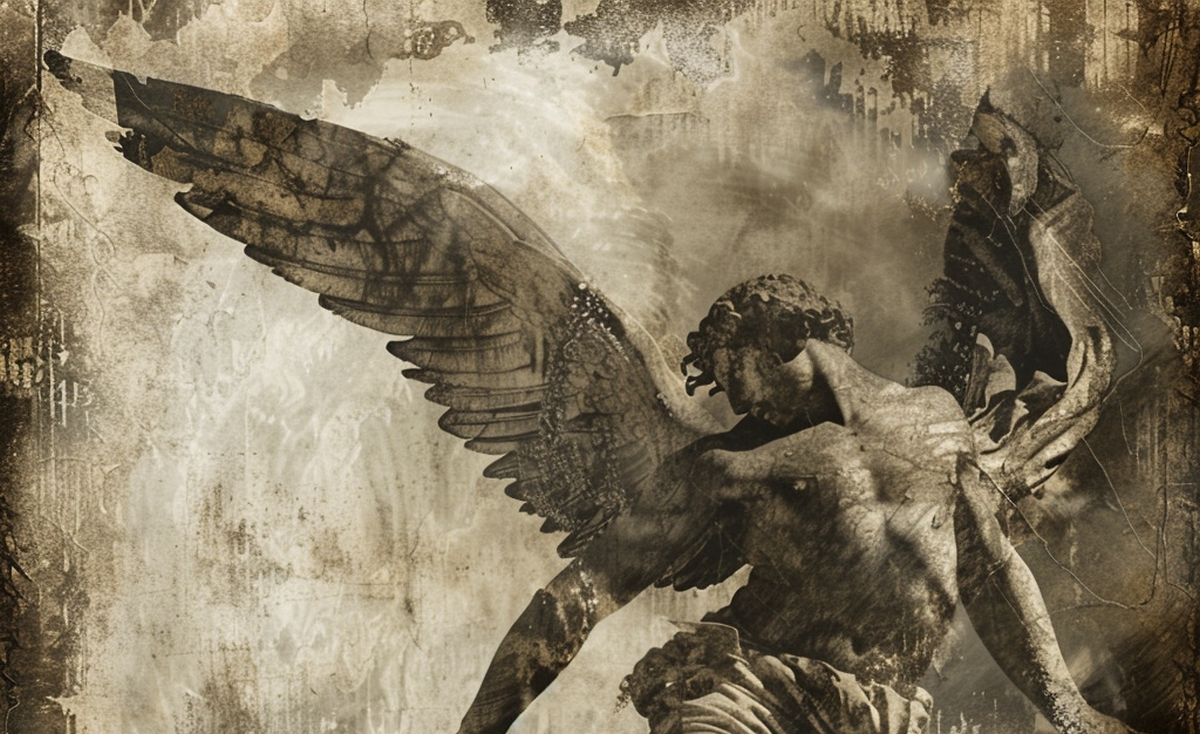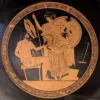
Icarus, son of the legendary craftsman Daedalus, is an iconic figure in ancient Greek mythology. His myth, a timeless symbol of human ambition and the passion for freedom, has inspired countless artists, poets, and thinkers throughout the centuries. His tragic story vividly depicts the eternal struggle of man against the chains that bind him, as well as the disastrous consequences of arrogance and disobedience.
In Greek mythology, Icarus embodies the irresistible human drive to transcend limits and restrictions. The young hero, carried away by the excitement of the unprecedented flight, defies his father’s advice and pays the price of disobedience with his own life. Icarus’s fall from the sky symbolizes man’s failure to tame his ambitions and realize the limits of his capabilities. At the same time, the myth underscores the value of daring, curiosity, and the thirst for knowledge, even if it sometimes leads to tragic outcomes.
According to the ancient Greek myth, Daedalus, a prisoner of King Minos in Crete, crafted wings made of wax and feathers for himself and Icarus to escape by flying. Before they embarked on their journey, Daedalus warned his son not to fly too high, lest the wax melt from the sun’s heat, nor too low, lest the wings get wet from the sea’s spray. But Icarus, intoxicated by the thrill of flight, ignored his father’s advice and flew higher and higher. Eventually, the wax melted, the wings disintegrated, and the young Icarus plunged into the sea, meeting a tragic death. This myth was destined to become a symbol of human ambition, daring, and the dangers lurking when one exceeds their limits.
The Enduring Saga of Icarus: From Ancient Greece to Reflections in American Literary Heritage
The Genesis of an Everlasting Narrative
The captivating and deeply resonant myth of Icarus, a pivotal tale originating in the annals of ancient Greek mythology, has embarked on an expansive journey through the corridors of time, serving as a profound muse for a multitude of artists, writers, and philosophical thinkers. The narrative of the youthful protagonist, who audaciously sought to ascend towards the sun utilizing wings constructed from wax and feathers, in direct contravention of his father’s sagacious counsel, persists as an inexhaustible wellspring of inspiration and introspective contemplation. From the epochs of antiquity to the contemporary era, Icarus has transcended his mythical origins to become an enduring emblem of human ambition, the insatiable pursuit of knowledge, and the relentless quest for unfettered liberty, a theme that resonates deeply within the American ethos of self-reliance and the pursuit of the “American Dream.”
The inception of the narrative concerning Icarus and his father, the esteemed artisan Daedalus, is first chronicled within the literary heritage of ancient Greece. Daedalus, celebrated for his exceptional intellect and unparalleled craftsmanship, found himself and his son confined within the labyrinthine confines of Crete, under the decree of King Minos. Driven by an unyielding desire for liberation, Daedalus meticulously fabricated wings composed of wax and feathers for both himself and Icarus. Prior to their aerial departure, the father imparted a critical admonition to his son, cautioning him against soaring too close to the sun, lest the solar heat melt the wax, and equally, against descending too near the sea, lest the wings become saturated with seawater. However, Icarus, consumed by the intoxicating exhilaration of flight, disregarded Daedalus’s prudent counsel and ascended precipitously into the heavens. Consequently, his wings succumbed to the intense heat, and the young hero tragically plummeted into the sea, meeting his untimely demise.
The Timeless Allure of the Myth
The myth of Icarus has captivated and moved countless generations, thanks to its profound symbolism and universal messages. The tragic figure of the young hero embodies the irresistible human tendency to transcend, the desire to surpass our limits and conquer the unattainable. At the same time, Icarus’s fall serves as a timeless warning about the dangers of arrogance, disobedience, and ignorance of our limits. As George Salis points out in his article “The Icarus Complex: The Influence of the Greek Myth of Icarus and Daedalus in 20th Century Literature,” the myth of Icarus “reflects the eternal human effort to overcome our limitations, whether they are natural laws, social norms, or mortality itself.” From ancient tragedy to modern literature and art, Icarus continues to inspire and provoke, posing timeless questions about human nature, dreams, and our limits. His immortal story remains relevant and familiar, as each of us can recognize in the young hero something of ourselves and our own attempts to soar and touch the unattainable.
Icarus in literature and art The tragic story of Icarus has been an inexhaustible source of inspiration for countless artists and writers throughout the centuries. From antiquity to the modern era, the myth of the young hero who dared to conquer the skies has fascinated and moved, offering a symbolic canvas for exploring the deeper human desires, fears, and limits.
Icarus in poetry and prose In literature, the myth of Icarus has sparked countless poetic and prose depictions. Already from antiquity, Homer refers to the story of Daedalus and Icarus in the Iliad, while Ovid narrates it extensively in the Metamorphoses. In more recent times, poets like William Carlos Williams, William Butler Yeats, and Rainer Maria Rilke have been inspired by Icarus to craft verses about human ambition, fall, and tragedy. In prose, writers like James Joyce and Ralph Ellison have used the myth as a metaphorical lens to explore issues such as resistance to authority, the search for identity, and the consequences of hubristic behavior. Through its diverse literary transformations, Icarus continues to embody the relentless human thirst for transcendence and freedom.
Visual and cinematic interpretations
Equally captivating has been the myth of Icarus for visual artists. From ancient red-figure amphorae to Renaissance and Baroque paintings, the fall of the young hero has been depicted with vivid colors and dramatic strokes. Artists like Pieter Bruegel the Elder, J.M.W. Turner, and Henri Matisse drew from the myth to create masterpieces that capture the moment of hubris and fall with evocative intensity. The echo of Icarus is felt even in cinema, with films like “Icarus” by Nikos Koundouros and “Birdy” by Alan Parker drawing inspiration from the ancient myth to explore the limits of freedom and the woes of confinement.
Spanning centuries and arts, the myth of Icarus remains an inexhaustible symbol of human fate. The story of the young hero who flew high and fell so low embodies in a heart-wrenching way the tragic beauty of our existence – our dreams and ambitions, but also our limits. Both fragile and fearless, like Icarus, we continue to spread our wings towards the sun, knowing that a fall is always possible. Yet, even the fall carries within it the spark of immortality – for as long as there are people, the name of Icarus will live, illuminating our own attempts to transcend ourselves and touch the infinite.
Icarus as an eternal symbol of human fate
The myth of Icarus, with its multi-layered symbolic power, continues to resonate in our hearts and minds, centuries after its birth in ancient Greece. The story of the young hero who dared to fly towards the sun embodies in a heart-wrenching way the tragic grandeur of human existence – our irresistible thirst for transcendence, but also the inevitable fall that often follows. Icarus, with his melted wings and lost dream, becomes an eternal symbol of our fate, reminding us that life is a constant struggle between light and darkness, hope and despair.
The tragic grandeur of the fall
Icarus’s fall from the skies, as painful as it is, carries within it a paradoxical beauty. It is the beauty of daring, adventure, the refusal to settle for the given. As Christopher Marlowe writes in “Doctor Faustus,” a work inspired by the myth of Icarus, “what is the meaning of life if we are confined to this small world, prisoners of our ambition?” (Li). Icarus, even in his fall, embodies this proud refusal to compromise, this unwavering dedication to the dream. And through his tragedy, he reminds us that it is better to live a life full of passion, even if it leads to destruction, than a life chained to fear and mediocrity.
A mirror of our own fate
Ultimately, the allure surrounding the myth of Icarus stems from its universality. Icarus is not just a hero of the past, but a mirror of our own fate. In his daring and fall, we recognize ourselves – our own attempts to transcend our limits, to touch the unattainable, to taste freedom. And in his tragic end, we see our own frustrations, our own melted dreams. For, like Icarus, we are all creatures made of flesh and blood, doomed to live between the desire for the transcendent and the chains of mortality. Yet, the essence of the human adventure lies precisely in this conflict. In our persistent effort to overcome our limitations, to become something more than what we are, even if the price is the fall. After all, it is this fall, with all the pain and redemption it carries, that makes us human.
The myth of Icarus, therefore, will remain forever relevant – an eternal symbol of human destiny. And every time we raise our eyes to the sky, seeking the light of the sun, the name of the tragic hero will echo within us as a warning, but also as an encouragement. For his story reminds us that the essence of life is not found in the flight or the fall, but in the relentless soaring of the soul beyond the chains and limits, towards the infinite.
Epilogue
The myth of Icarus, a masterpiece of ancient Greek mythology, continues to captivate and inspire, centuries after its birth. Through the tragic story of the young hero who dared to fly towards the sun, we see our own fate – our desires and ambitions, our dreams and disappointments. Icarus becomes an eternal symbol of human daring and the thirst for transcendence, but also a constant reminder of our limits and fragile nature. In art and literature, his figure continues to inspire, illuminating the deepest and darkest aspects of our existence. And through his immortal story, we learn that the essence of life lies in the endless soaring of the soul, even in the face of the possibility of falling.
elpedia.gr
Bibliography
- Li, LI. “The Inevitable Fall: Christopher Marlowe’s Doctor Faustus and the Icarus Myth.” Studies in Literature and Language, 2012, hansrajcollege
- Salis, George. “The Icarus Complex: The Influence of the Greek Myth of Icarus and Daedalus in 20th Century Literature.” Galaxy: An International Multidisciplinary Research Journal, 2016, galaxyimrj

